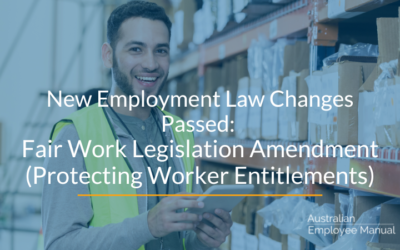Having casual employees on board can be a real game-changer for any workforce. When you know how to make the most of them, they become your secret weapon for managing the ups and downs of workloads.
They ensure that your business remains fully staffed throughout all your opening hours, and they’re there to cover for others when they go on holidays or take breaks. It’s like having a flexible and reliable backup squad ready to step in whenever you need them.
But if you blur the line between labelling an employee as casual while they are functioning as a part-time employee, you run the risk of violating the Fair Work Act and other legal regulations
What is casual employment?
In accordance with the Fair Work Act, casual employees are individuals who accept a job offer knowing that there is no firm advance commitment to ongoing work with a predetermined pattern.
This means they have no expectation of consistent work, and their hours can vary from week to week. They have the freedom to accept or decline shifts and can terminate their employment without prior notice.
Unlike part-time or full-time employees, casuals do not receive benefits such as sick leave or annual leave. However, their pay includes a loading to compensate for the absence of these benefits.
What is a part-time employee?
Part-time employees, on the other hand, work fewer than 38 hours per week, and their hours are typically regular and fixed each week.
They have a contractual agreement with their employer for ongoing work, either on a permanent or fixed-term basis.
Part-timers enjoy the same benefits as full-time employees but on a pro-rata basis, considering their reduced working hours.
Generally, part-time employees are expected to fulfill the agreed-upon hours, unless they are granted approved paid or unpaid leave. If they wish to resign, they are required to provide notice in the same manner as full-time employees.
Signs that Your Casual Might Actually Be a Part-Time Employee
To avoid legal complications, it’s important to be aware of the following factors that may indicate your casual employee should be classified as a part-time employee:
- Regular and Ongoing Roster: Their roster remains consistent week after week, with minimal changes to their start and end times as well as the days they work.
- Formal Documentation: They have a formal letter or contract with you that outlines their specific hours, work, and roster.
- Weekly Wages: Instead of being paid hourly or daily, they receive a weekly wage.
- Length of Employment: They’ve been with your company for a considerable period.
- Significant Weekly Hours: They work a substantial number of hours each week.
- Mutual Expectation of Continued Employment: Both you and the employee have a shared expectation of continued employment.
- Advanced Notice of Leave: When they need to take time off, you require advance notice from them.
- Lack of Initial Casual Documentation: There is no initial documentation clearly stating their employment as a casual.
Permanent Conversion
One important aspect of employment to consider is the entitlement for eligible casual employees to convert to permanent employment, known as casual conversion, as outlined in the National Employment Standards.
There are two ways this can happen: the employer offering casual conversion or the employee requesting to be converted.
For all employers, except small businesses, it is mandatory to make a written offer to convert casual employees to permanent status once they have completed 12 months of employment. To be eligible for conversion, the employee must meet the following criteria:
- They have been employed by the company for 12 months.
- They have worked a regular pattern of hours consistently for at least the past 6 months.
- They can continue working these hours as a full-time or part-time employee without significant changes.
Small business employers, defined as those with fewer than 15 employees, are not legally required to offer casual conversion. However, employees in small businesses still have the right to request conversion to permanent employment once they have completed 12 months or more with the company.
An employer can decline a conversion request or refuse to offer conversion to an eligible employee, but only after consulting with the employee and providing reasonable grounds. These grounds must be based on known or reasonably foreseeable facts.
Reasonable grounds for refusal can include the following circumstances that may occur within the next 12 months:
- The employee’s position will no longer exist.
- The employee’s hours of work will significantly decrease.
- The employee’s work days or times will undergo significant changes that cannot be accommodated within their available schedule.
Other reasonable grounds for refusal may include the need to comply with recruitment or selection processes mandated by Commonwealth, State, or Territory laws, or if employing the employee on a full-time or part-time basis would require significant adjustments to their work hours.
Actions for Your Business
To ensure compliance with employment regulations and properly manage your workforce, consider taking the following actions:
- Review Employee Rosters: Take a close look at the rosters of all casual employees in your workplace, paying special attention to those who have been with you for more than 6 months. Look for any regular and ongoing patterns in their work schedules.
- Provide Casual Employee Information Statement: Make sure that each casual employee has been given a Casual Employee Information Statement. It is a legal requirement to provide this statement either before or as soon as possible after they start their employment with your company.
- Review Employment Contracts: Go through all the contracts and letters of appointment for your casual employees to ensure that their status as casual employees is clearly stated. This helps to avoid any confusion or misclassification.
- Offer Casual Conversion (for employers with 15 or more employees): If your company has 15 or more employees, it’s important to have a process in place to offer eligible casual employees the right to convert to permanent employment within 21 days of their 12-month anniversary. Ensure you follow the proper procedure for making this offer.
- Consider Changing Employment Status: If you notice a consistent pattern of regular, systematic, and ongoing employment with a casual employee, it’s likely that they should be considered a part-time employee. In such cases, it’s essential to formally change their employment status to reflect their actual work arrangement.
- Review your HR Policies and Procedures. Review your policies and procedures to ensure they give guidance to managers and employees on casual conversion processes for your business.
By taking these actions, you can proactively manage your workforce, ensure legal compliance, and maintain a fair and transparent employment relationship with your employees.




